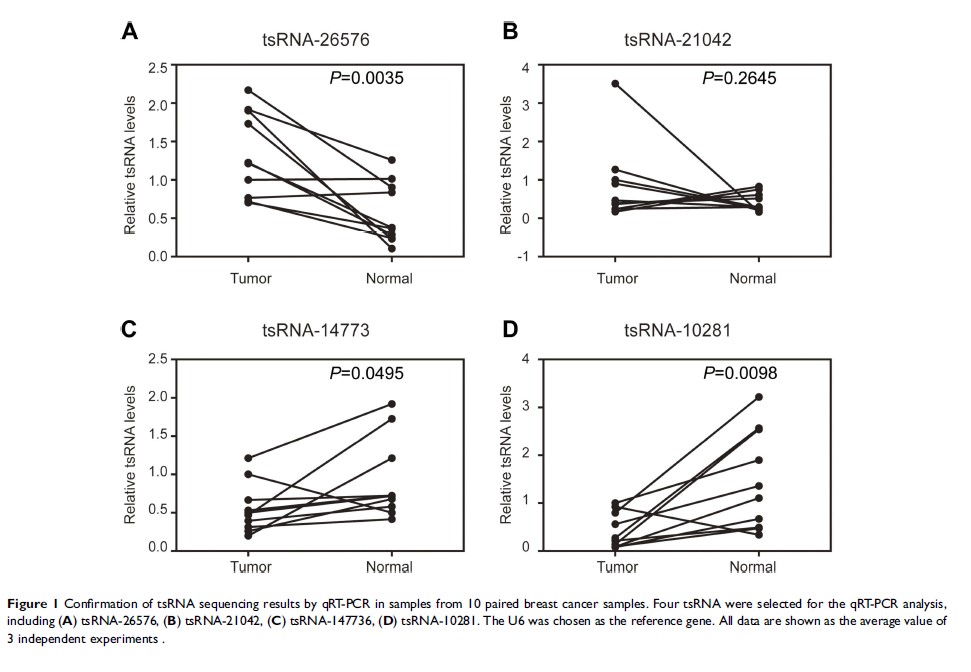9 1 2 3 6
论文已发表
注册即可获取德孚的最新动态
IF 收录期刊
- 2.6 Breast Cancer (Dove Med Press)
- 3.9 Clin Epidemiol
- 3.3 Cancer Manag Res
- 3.9 Infect Drug Resist
- 3.6 Clin Interv Aging
- 4.8 Drug Des Dev Ther
- 2.8 Int J Chronic Obstr
- 8.0 Int J Nanomed
- 2.3 Int J Women's Health
- 3.2 Neuropsych Dis Treat
- 4.0 OncoTargets Ther
- 2.2 Patient Prefer Adher
- 2.8 Ther Clin Risk Manag
- 2.7 J Pain Res
- 3.3 Diabet Metab Synd Ob
- 4.3 Psychol Res Behav Ma
- 3.4 Nat Sci Sleep
- 1.9 Pharmgenomics Pers Med
- 3.5 Risk Manag Healthc Policy
- 4.5 J Inflamm Res
- 2.3 Int J Gen Med
- 4.1 J Hepatocell Carcinoma
- 3.2 J Asthma Allergy
- 2.3 Clin Cosmet Investig Dermatol
- 3.3 J Multidiscip Healthc

小 RNA 测序揭示了一种新的 tsRNA-26576 介导的乳腺癌肿瘤发生
Authors Zhou J, Wan F, Wang Y, Long J, Zhu X
Received 22 December 2018
Accepted for publication 24 March 2019
Published 2 May 2019 Volume 2019:11 Pages 3945—3956
DOI https://doi.org/10.2147/CMAR.S199281
Checked for plagiarism Yes
Review by Single-blind
Peer reviewers approved by Ms Justinn Cochran
Peer reviewer comments 2
Editor who approved publication: Dr Ahmet Emre Eskazan
Purpose: As a
malignancy that develops from breast tissue, breast cancer has been widely
regarded as the most common type of cancer threatening the health of women
worldwide. Emerging evidence has demonstrated that tsRNAs might play a vital
part in the tumorigenesis and progression of several types of cancers. However,
the functions of tsRNAs in breast cancer remain largely unknown. Here, we
investigated the functions of tsRNA-26576 in tumorigenesis of breast cancer.
Patients and methods: In this
study, the tsRNA deregulation states in breast cancer patients (four cancer
tissues and four adjacent normal tissues) were evaluated using small RNA
sequencing. And then, RT-PCR was used to detected the tsRNA-26576
expression level in breast cancer patients.
Results: A total
of 263 tsRNAs were identified as significantly differentially expressed, of
which 75 were upregulated, and 188 were downregulated. The functional
classification through KEGG pathway database illustrated that the most
significant pathway enriched by the targets of differentially expressed tsRNAs
was the pathway in cancer. Among these differently expressed tsRNAs, we found
that tsRNA-26576 was remarkably upregulated in cancer tissue in comparison with
adjacent normal tissue. Meanwhile, RT-PCR results verified that tsRNA-26576
expression level was highly upregulated in 10 paired samples from breast cancer
patients. Besides, tsRNA-26576 was found to motivate cellular multiplication
and migration while suppressing cellular apoptosis in MDA-MB-231 cells.
Moreover, mRNA sequencing results showed that several tumor suppressor genes, including
FAT4 and SPEN, were upregulated after delivering tsRNA-26576 inhibitor in
MDA-MB-231 cells.
Conclusion: We found
tsRNA-26576 was upregulated in breast cancer tissue, and it could promote the
cell growth while inhibite cell apoptosis. Therefore, tsRNA-26576 might serve
as a potential clinical therapy target and a predictive marker for breast
cancer.
Keywords: malignancy,
tsRNA, MDA-MB-231 cells, predictive marker
